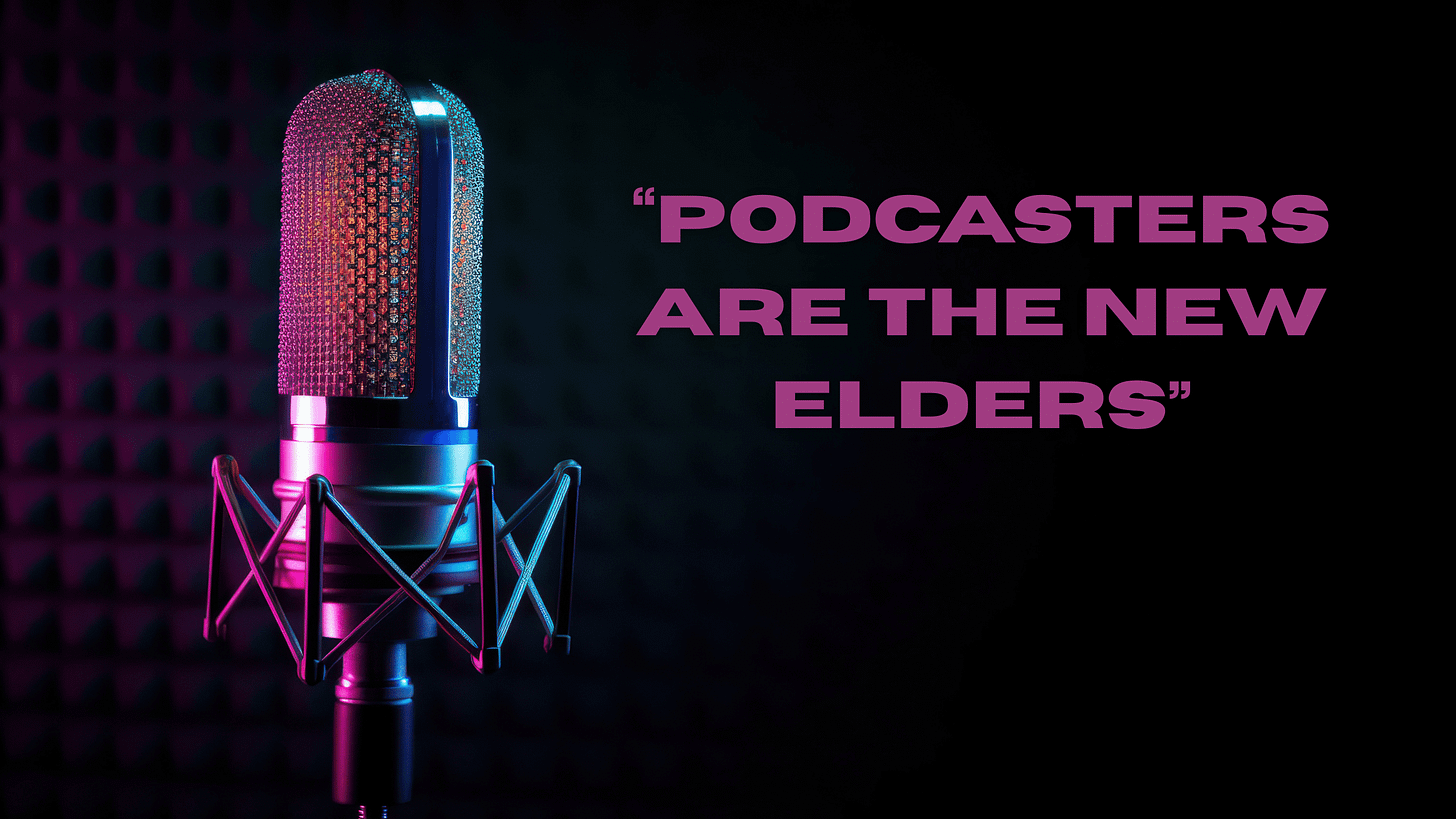"Podcasters Are the New Elders"
Not an ideal situation...
I received a message from a preacher recently who, speaking from exasperation, made the comment that “podcasters are the new elders.”
That certainly raised an eyebrow. To be clear, he was not saying it as a good thing, and I’m not repeating it as a good thing, either.
His point was, as Christians struggle to navigate the utterly confusing, rapidly changing world of our day, they do not feel they can turn to their elders. Rather, they go online to look for someone who has answered their questions, and often find their answers from people with a microphone and a camera.
As somebody who spends a lot of time producing content online, this is not a pat on my own back. If you’ve read this site for any length of time, you know I am begging churches to talk about the pressing issues of our day.
I would love nothing more than for more preachers to get their hands dirty with the challenging subjects facing our people, and for their elders to back them 100% when they do.
But unfortunately, in so many cases, that isn’t happening.
Every single week I get messages from people asking questions that they can’t get answered locally. I think it’s fair to say that both they and I would much rather they have somebody they trust in their church who they could ask. If they had an older mentor who is in touch with the world, knows the Word, and is available to his people, they would not be turning to internet strangers.
As churches so often skirt around the pressing issues of our day, or touch on them just enough to say they preached the text, but keep it generic enough that nobody knows what to do with it, the sheep starve and begin to wander to other pastures.
We have to realize, the elder role is not about keeping the lights on in the building, setting the preacher’s salary, or approving programs. It’s shepherding, and shepherding requires close contact with the sheep. They need to know what’s going on in the lives of their people and be in touch with the concerns that are on the members’ hearts and minds.
We who write and podcast are not the ministers or elders to the people who read and listen. We’re blessed to be able to help, but we can never replace the hands-on approach local leaders were appointed to give. So, they need to make sure they’re giving it.
This kind of leadership requires a two-pronged approach
First, leadership has to be connected to their people
You can see in Paul’s writing how much he knew and cared for the churches he served, and how he wanted their leaders to do the same (Acts 20, 1 Thessalonians 2:7, 1&2 Timothy and Titus). People don’t come to someone for answers if the person is not available to them.
Instead, elders should be hospitable (1 Timothy 3:2), spending invaluable table fellowship time with people to create opportunities for meaningful conversation. Know people’s names, their kids’ names, their jobs, and how you can pray for them. Keep close contact.
Second, leadership has to be in touch with the world around them
If you go to someone for advice, and they prove they are out of touch with your situation, you usually don’t go to them again. The world is changing so rapidly, and people are facing challenges that were not even a consideration a few decades ago.
“When I was your age…” anecdotes grow less helpful by the day. If you want to help people, you have to spend some time in their shoes rather than demanding they walk around in yours. That takes time and effort, but that’s the nature of the job.
In 2 Samuel 15:1-6, David’s son Absalom put in the legwork that would eventually help him stage a short-lived coup of the throne. How did he do it? He listened to the people’s problems. That’s it.
“In this manner Absalom dealt with all Israel who came to the king for judgment; so Absalom stole away the hearts of the men of Israel” (15:6).
Now, obviously Absalom was a bad guy with ulterior motives, but we can learn a valuable lesson from his tactics. If you want to win people over, care about their problems. Do not be aloof, but sympathize with them. Be in their corner.
Unfortunately, right now many people are running to podcasters to get somebody who can be an artificial simulation of having a person “in their corner.” But they would be better off having what God designed, which is for experienced Christian men and women in their own hometown who care enough about them to love them, pray for them, and invest some time into them—starting with their elders.
Notes
As always, subscribing is free, and support is greatly appreciated
Think Deeper Podcast this week will be of particular interest to all of my coC readers as we discussed the Top 5 Struggles for the churches of Christ. Watch below or listen on your podcast app!




Excellent article… I do think the “powers that be” (Satan) has really hamstrung our efforts in the church. They have labeled EVERYTHING political. You have to be “politically correct” to not offend anyone now… 🔥
Why is abortion political? Why is transgenderism political? Why is the LGBTQ+ lobby political? Why is the absolute toxicity of feminism political? Why is the topic of political violence, political?
Etc. etc. etc.… 🤦🏽♀️
Isn’t there an old saying that goes something like this… “If you don’t stand for something, you’ll fall for anything?”
Believe me, I would absolutely LOVE to talk about some of these issues locally and the scriptures behind them… but, I’m really not sure how that would be received… 😔
🙏🏽💖🙏🏽 keep up the good work Mr. Jack 👍🏽👍🏽👍🏽
As someone who has been producing online content for 20 years, I agree with this 100%. There's a lot of good that can be done with articles, podcasts, and videos online, but they are no substitute for elders in the local church, shepherding the flock among them, and watching out for the dangers and challenges currently threatening the sheep (rather than looking backward to the threats that faced the church a generation or two ago).